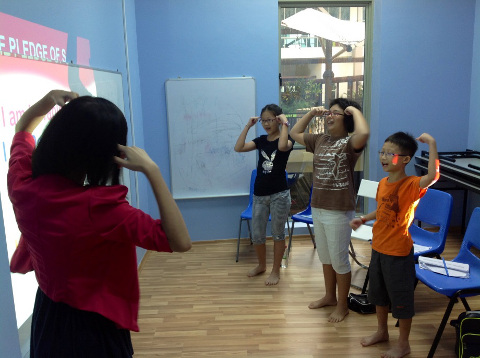Public speaking is not emphasized in schools here. But if you think about it, speaking in front of a class can be just as intimidating for children as it is for adults! It is an important life skill to develop.
With effect from 2015, the Ministry of Education will revise its teaching of English at Upper Primary School. The focus will shift to Oracy skills, making the students speak the language more confidently and know how to use it beyond the classroom.
In the new PSLE oral exams, pupils will have to respond to anything from a poster to a map to a biscuit wrapper. Pupils will have to hold a conversation with the examiner, to give their opinions and to say what they think of the situation.
Making a speech in public is not as daunting as sitting for oral exams, since there is only one audience.
Here are things you can do to bolster their confidence so that your child can give their best.
1. Offer a Listening Ear
If the speaker asks you to listen while they practise their speech, be generous with your time and do just that. It may be a big moment for them and they need all the help they can get to make it perfect. Offer to take them away from the everyday hustle and bustle to find a quiet spot when they can speak freely without inhibitions.
Then listen. Truly listen.With your ears, your eyes and your mind. Even if you’ve heard the speech a few times before, try to form first impressions of the speaker: what they say and how they say it. Make unobtrusive notes so that you don’t throw the speaker off-track.
Listen to the entire speech, not just part of it so that you don’t form the wrong impression and end up ruining rather than enhancing the speech.
2. Don’t Offer Unsolicited Advice
During the speech, don’t rush to point out mistakes immediately. Be content in noticing and observing and listening. Only when the speaker has finished should you identify their strengths and weaknesses.
3. Be Gentle and Positive
Remind the speaker that your feedback is only your opinion. Find and start with a positive point – the topic, the subject matter, the opening line, the closing note, the quotations, the examples, the voice, the jokes, or the body language. Speak about it with enthusiasm. Buoy up their spirit.
Later, when touching upon improvement areas, never tease, taunt or look down upon the speaker. Stick to the facts, be impersonal and talk politely but plainly. No one likes to hear criticism but no one will get offended by a sensible critique.
4. Be Genuine
Feedback that is insincere is useless and helps neither the giver nor the taker. Believe in what you say. Backing your thoughts with solid evidence and data makes it more worthwhile.
5. Don’t Berate
If the final speech doesn’t go well, the speaker is already going to be upset, hurt or embarrassed. Don’t make them feel worse by heaping on an “I told you so”. Sympathise, support and help them snap out of it by pointing out that losing one battle does not mean the war is lost. There are sure to be plenty more opportunities and with practice, they can only get better.
6. Get Help
Professional orators must invest time and effort in studying the art and science of speaking. An expert guide or mentor can provide valuable tips on its many aspects, and design a comprehensive development programme. For amateur speakers, supporters can offer to research a subject, edit and proof-read the speech, video a practise session for reviewing later, etc.
My initial setback in public speaking was not all gloom and doom for me. My love for the English language manifested itself in another way – writing. While giving me the same pleasure, confidence and comfortable anonymity from having my audience assess the words instead of the wordsmith, writing can be as impactful, influential and far-reaching as speaking.
Will I ever go looking for a chance to conquer my demons and make a formal public speech again?
I don’t know. But I do know that when my daughter is standing up there behind the podium, I will have been there with her every step of the way.
For me, my child will always be a winner.
By Devyani Borade.
Part 1: How To Help Your Child Be Comfortable With Public Speaking (Part 1)
* * * * *
Like what you see here? Get parenting tips and stories straight to your inbox! Join our mailing list here.
Want to be heard 👂 and seen 👀 by over 100,000 parents in Singapore? We can help! Leave your contact here and we’ll be in touch.





























































Leave a Comment: